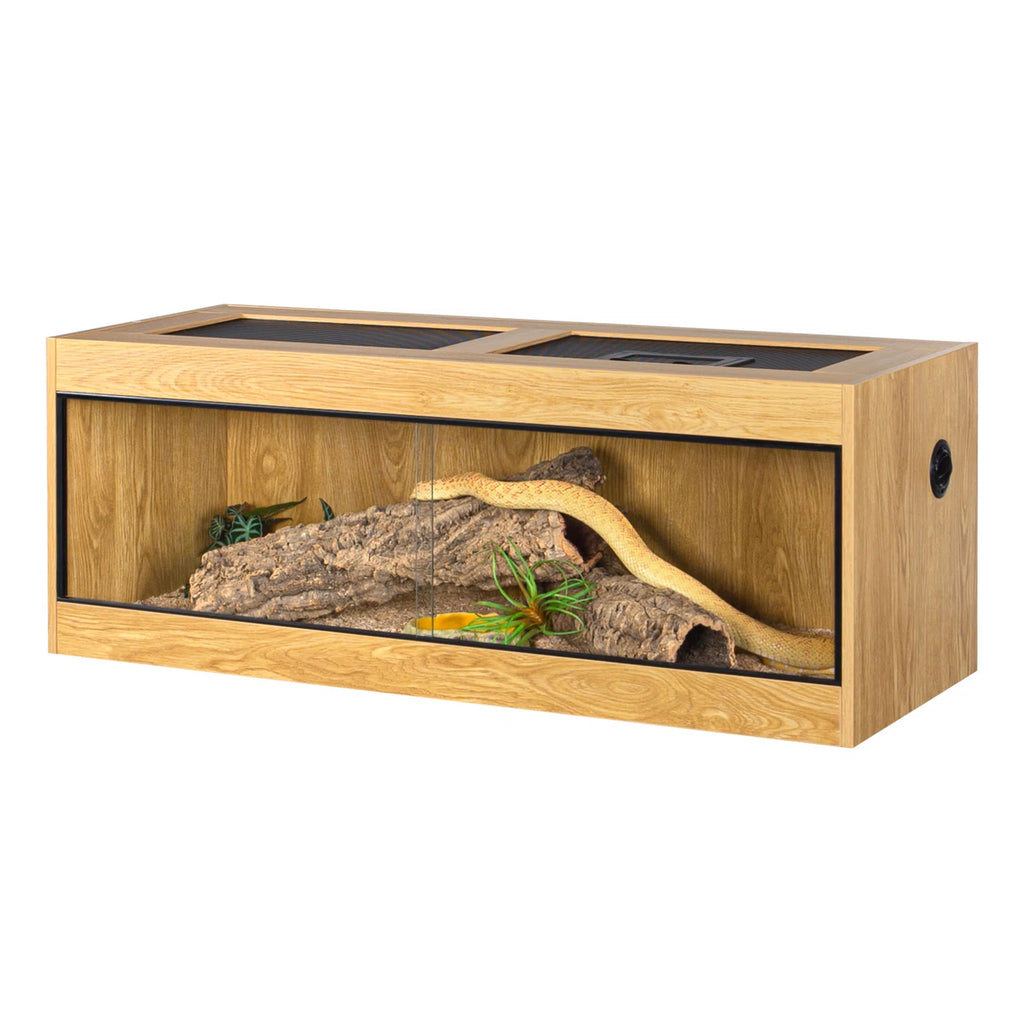Corn snakes (Pantherophis guttatus) are one of the most popular pet snake species due to their docile nature and beautiful colors. To ensure your corn snake thrives in captivity, providing a suitable habitat is essential. In this article, we'll delve into the specifics of corn snake habitat, discussing tank and cage essentials to keep your slithery friend happy and healthy.
Choosing the Right Enclosure:
Selecting the right corn snake habitat & tank & cage is your first step in creating a comfortable and secure environment for your corn snake. Corn snakes are relatively small, reaching lengths of 3-5 feet, so you don't need a massive enclosure. A 20-30-gallon tank should suffice for an adult corn snake, while a smaller tank or enclosure is suitable for younger snakes.
Substrate:
The substrate, or bedding material, is critical in mimicking the natural environment of a corn snake. Aspen shavings, cypress mulch, or paper towels are excellent choices. These substrates provide a comfortable surface for your snake to move on and maintain proper humidity levels within the enclosure.
Temperature and Lighting:
Corn snakes are ectothermic, which means they rely on external heat sources to regulate their body temperature. To create a temperature gradient, place a heat pad or heat lamp on one side of the enclosure, allowing your snake to move between warm and cool areas.
The warm side should range from 85-90°F (29-32°C), while the cooler side should be around 75-80°F (24-27°C). Corn snakes do not require UVB lighting as they are primarily nocturnal. However, a natural day-night cycle can be established using a basic light timer. This will help regulate your snake's circadian rhythm.
Hide Boxes:
Corn snakes are shy creatures and appreciate a place to hide and feel safe. Provide at least two hide boxes in the enclosure: one on the warm side and one on the cool side. These hide boxes can be as simple as small plastic containers with an entrance hole cut into the side.
Water Source:
A clean and accessible water bowl is crucial for your corn snake's health. Ensure it is large enough for your snake to soak in if desired. Change the water regularly to maintain cleanliness and humidity.
Maintaining Proper Humidity:
Corn snakes require a moderate level of humidity, around 40-60%. This can be achieved by misting the enclosure with water, using a humidifier, or placing a shallow water dish near the heat source. Proper humidity is essential for shedding, as it helps your snake remove old skin more easily.
Feeding and Handling:
Corn snakes are carnivores, primarily feeding on mice and small rodents. Feed your snake an appropriately sized prey item every 7-10 days, adjusting the size as your snake grows. Always use tongs to offer food to avoid accidental bites. When handling your corn snake, be gentle and patient. Start with short sessions to allow your snake to become accustomed to your touch. As your snake becomes more comfortable, you can increase the duration of handling.
Cleaning and Maintenance:
Regularly clean the enclosure to maintain a healthy environment for your corn snake. Remove waste, replace substrate as needed, and clean the water dish and hide boxes. A deep clean, including disinfection of the entire enclosure, should be done every few months.
Environmental Enrichment:
While corn snakes are relatively simple to care for, they still benefit from environmental enrichment. Add branches, rocks, or fake plants to the enclosure to create hiding spots and climbing opportunities. Rearranging these items periodically can also provide mental stimulation for your snake.
Creating the perfect corn snake habitat involves careful consideration of tank and cage essentials. By providing a comfortable enclosure with the right substrate, temperature, humidity, and hiding spots, you can ensure your corn snake lives a long and healthy life in captivity. Remember to maintain a proper feeding and cleaning schedule, and handle your snake with care to foster a strong bond between you and your scaly companion. With the right setup and care, your corn snake will thrive and become a beloved member of your family.
For More Info:-






Comments